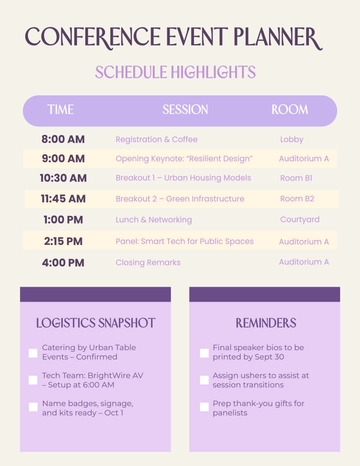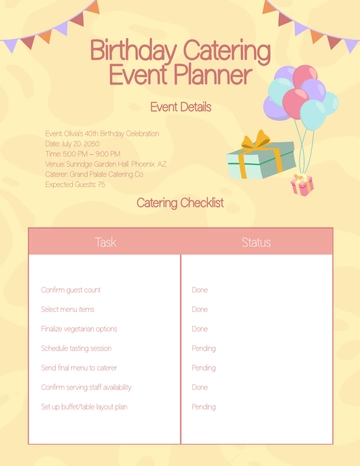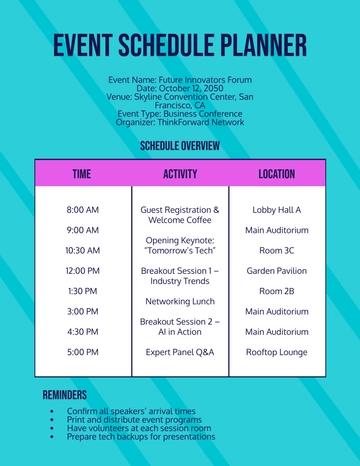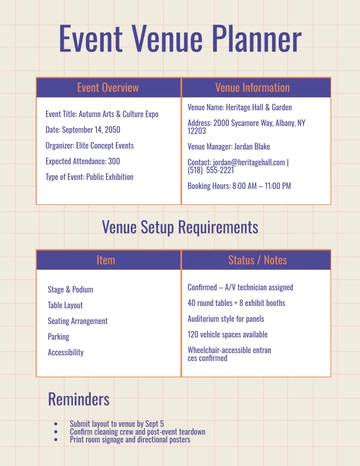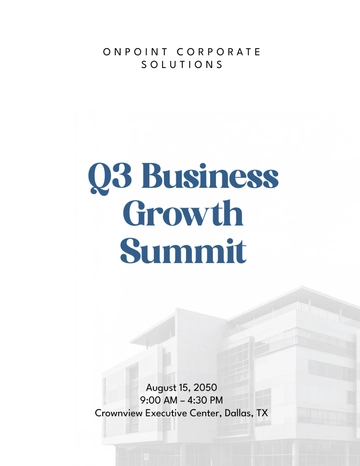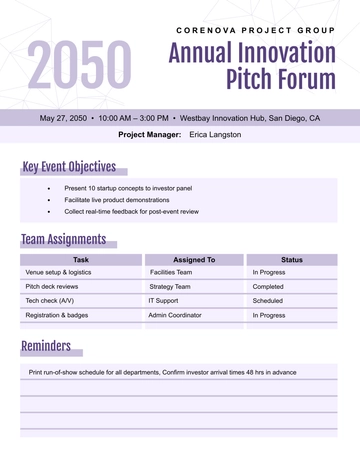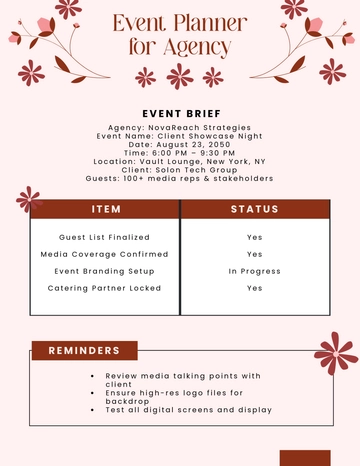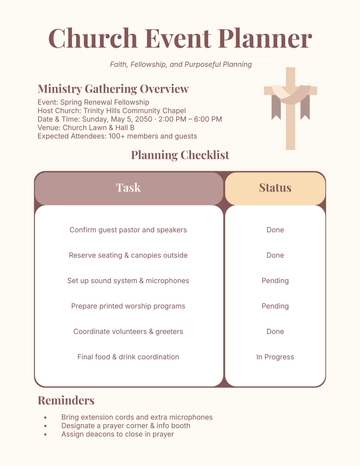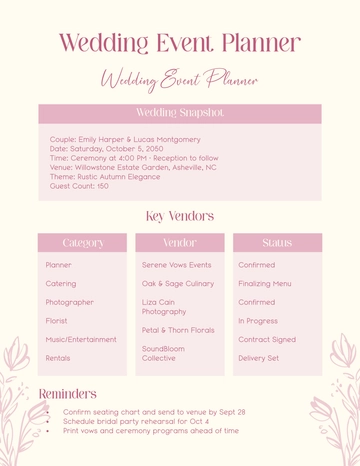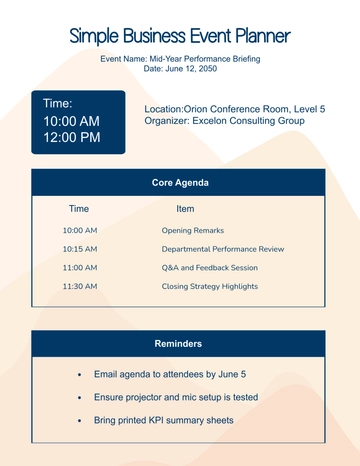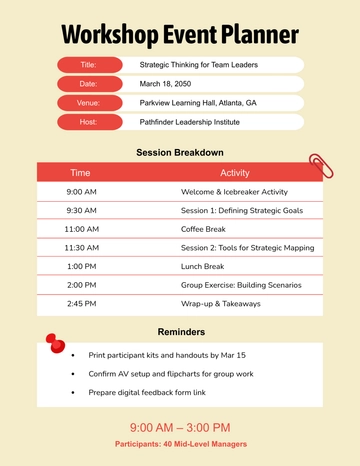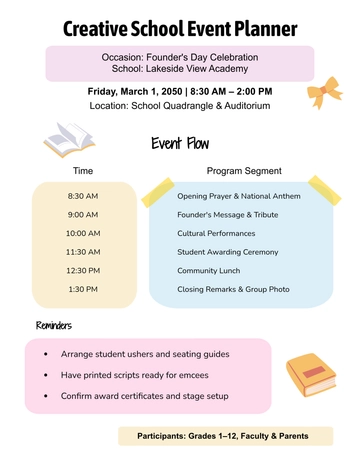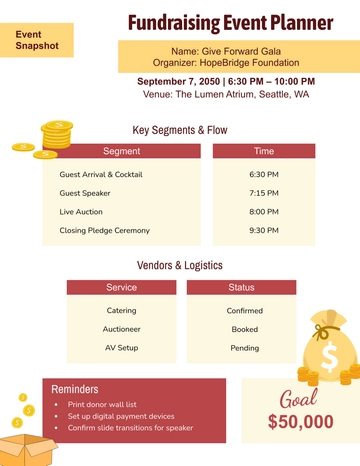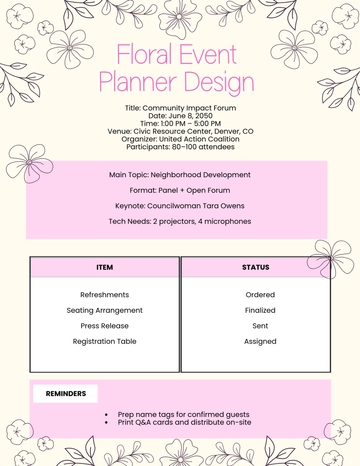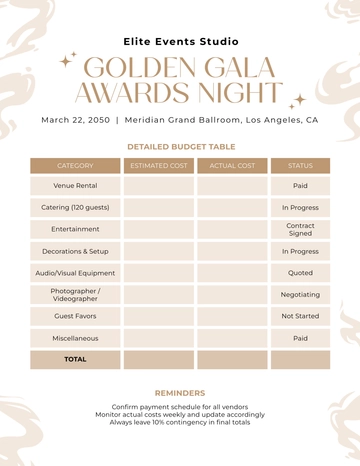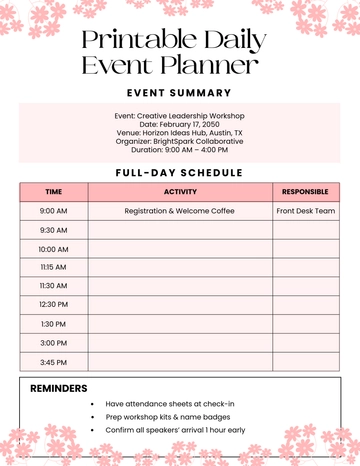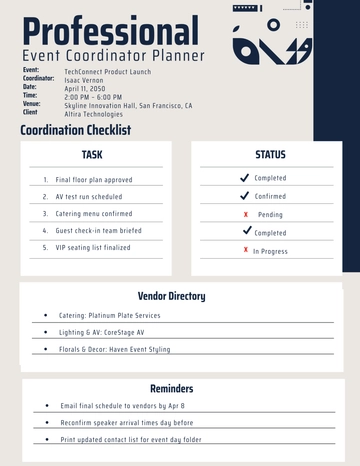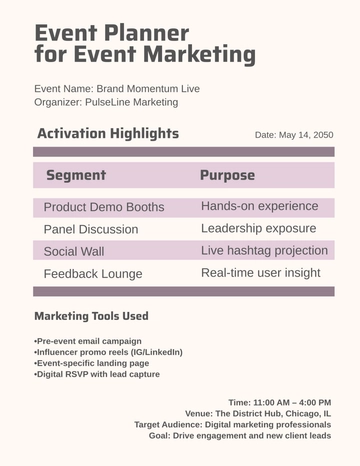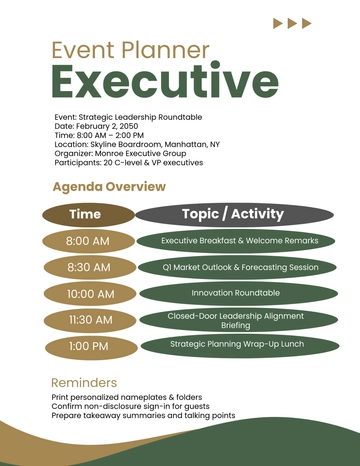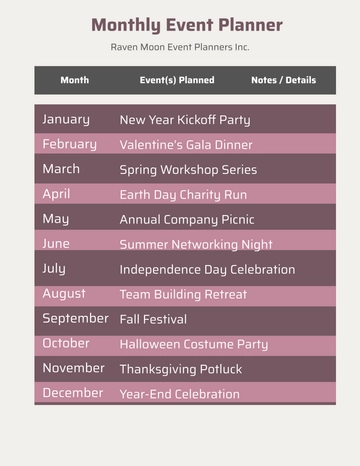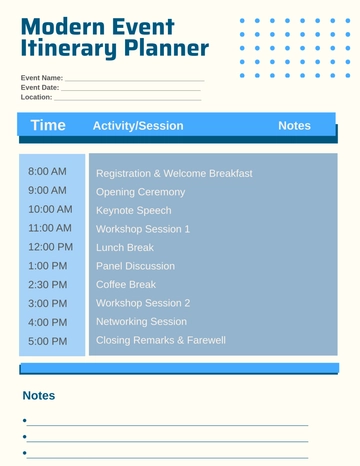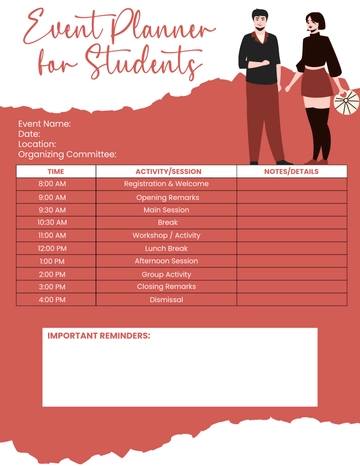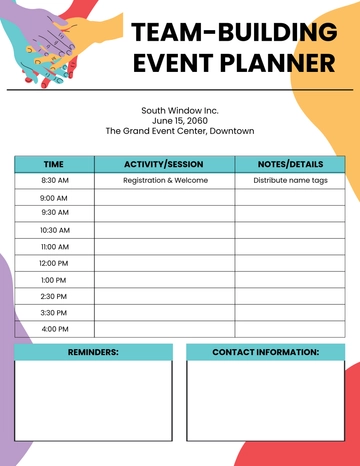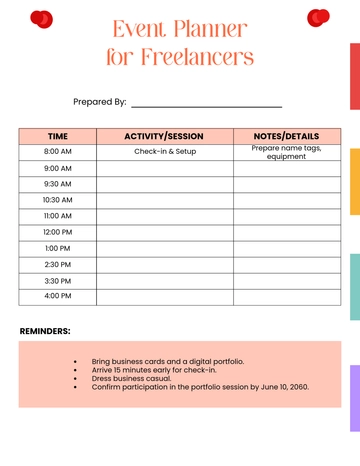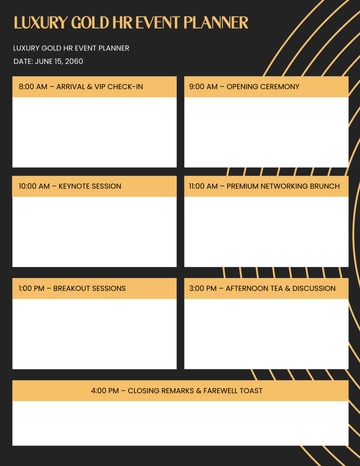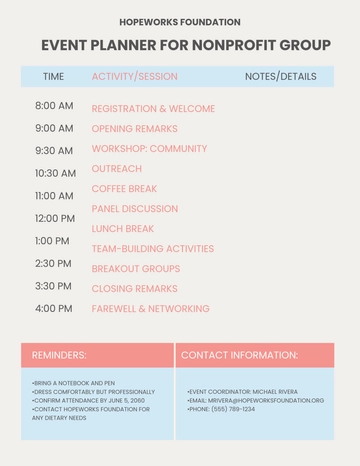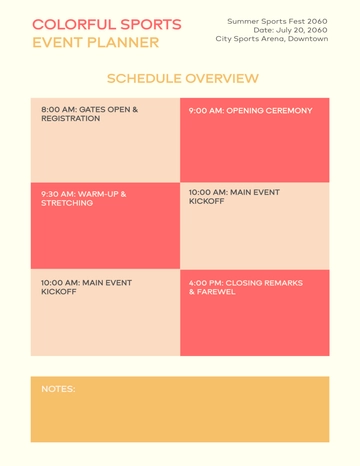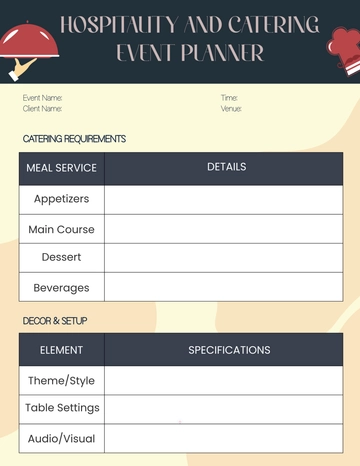Free Event Planner Plan
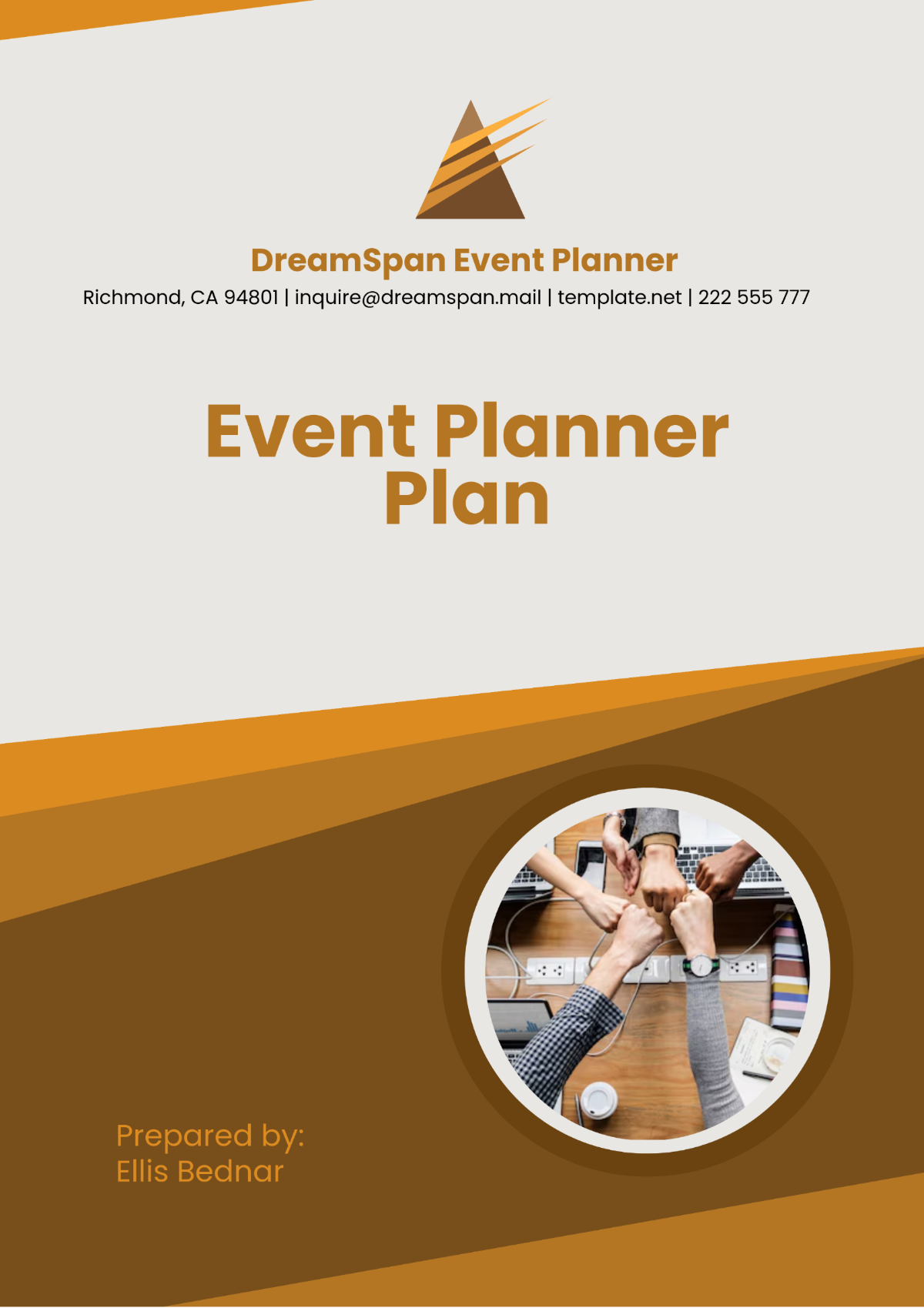
I. Introduction
Planning an event requires meticulous attention to detail and strategic organization. At [Your Company Name], we recognize that each event is unique, reflecting the vision and needs of our clients. Whether organizing a corporate gathering, a wedding, or a community festival, our approach emphasizes thorough planning and effective communication to create memorable experiences. This plan serves as a comprehensive guide, detailing the essential steps and considerations needed to ensure the successful execution of any event.
Effective event planning involves several critical phases, including initial concept development, budgeting, venue selection, logistics coordination, and post-event evaluation. Throughout this process, we prioritize compliance with local regulations and industry standards to mitigate risks and enhance guest safety. By aligning our strategies with best practices, [Your Company Name] aims to provide a structured framework that not only meets client expectations but also fosters creativity and innovation. Our commitment to excellence ensures that every aspect, from vendor management to attendee engagement, is meticulously crafted, allowing clients to enjoy their events worry-free. With this plan, we empower our team to deliver exceptional service, driving our mission to create unforgettable experiences for every occasion.
II. Preliminary Planning
1. Define the Event Purpose and Objectives
Understanding the core purpose of the event and establishing clear objectives are foundational steps in the planning process. At [Your Company Name], we emphasize the importance of identifying the event's primary goal, whether it be to educate, celebrate, network, or promote a product. This involves analyzing the target audience to tailor the experience to their interests and expectations. For instance, a corporate conference may focus on professional development, while a wedding centers on personal celebration. By articulating specific objectives, such as increasing brand awareness by a certain percentage or engaging a defined number of attendees, we can measure the event's success and align all planning efforts toward achieving these goals. Additionally, defining key messages ensures consistency throughout the event, providing attendees with a cohesive experience that resonates with their needs and motivations.
2. Establish the Event Budget
Allocating and managing a budget is crucial for the success of any event. A comprehensive budget should include all possible expenses, such as venue rental, catering, marketing materials, technical equipment, entertainment, and staffing. It is essential to conduct thorough research and obtain multiple quotes to ensure cost-effectiveness while maintaining quality. Additionally, incorporating contingency funds—typically 10-20% of the total budget—helps address unforeseen expenses that may arise during the planning and execution phases. Tracking expenses closely and using budgeting software can enhance transparency and control, allowing for adjustments as needed. Regular budget reviews also help in making informed decisions, ensuring that the event remains within financial parameters while delivering a high-quality experience. By carefully managing the budget, [Your Company Name] aims to maximize resources, enabling us to focus on delivering an exceptional event that aligns with our clients' objectives.
Expense Category | Estimated Cost |
|---|---|
Venue | $5,000 |
Catering | $3,500 |
Marketing | $2,000 |
3. Choose a Date and Location
Selecting an appropriate date and venue is pivotal to the success of an event and requires careful consideration of various factors. At [Your Company Name], we recommend starting with a brainstorming session to identify potential dates, taking into account the type of event, the target audience's availability, and any conflicting events in the area that could affect attendance. Seasonal considerations may also play a significant role; for instance, outdoor events are often best held in spring or fall when weather conditions are more favorable.
Once a date is selected, the focus shifts to identifying the ideal location. Accessibility is a key factor in this process; the venue should be conveniently located for the majority of attendees, with adequate transportation options, parking, and accommodations. Additionally, the venue's capacity should match the anticipated guest count, allowing for comfortable movement and engagement throughout the event. Evaluating the venue's amenities, such as audiovisual capabilities, catering services, and layout options, is also crucial to ensure it meets the specific needs of the event. By thoroughly assessing these aspects, [Your Company Name] can secure a venue that not only aligns with the event’s objectives but also enhances the overall experience for all attendees. Ultimately, the right date and location can significantly impact the event's success and attendee satisfaction.
III. Event Design and Planning
1. Develop the Event Theme
Thematic development is a crucial aspect of event planning that can significantly enhance the attendee's experience. At [Your Company Name], we believe that a well-defined theme ties together various elements of the event, creating a cohesive atmosphere that resonates with attendees. This theme should reflect the event's purpose and objectives, whether it’s a formal gala, a corporate workshop, or a casual community gathering. Incorporating visual elements, such as color schemes, décor, and branding, helps reinforce the theme and creates an engaging environment. Additionally, the theme can inform the choice of entertainment, activities, and even catering options, ensuring a unified experience. For example, a "Roaring Twenties" theme could influence everything from the event's promotional materials to the attire of the attendees. By carefully crafting a theme that aligns with the event’s goals and audience, [Your Company Name] enhances engagement and fosters lasting memories for all participants.
2. Create a Detailed Timeline
Establishing a detailed timeline is essential to ensure that every aspect of the event is meticulously planned and executed. At [Your Company Name], we recommend breaking down the event planning process into specific tasks, each with assigned deadlines. This timeline should include crucial milestones such as securing venues and vendors, confirming guest speakers, launching promotional activities, and finalizing logistics. Regular check-ins on the timeline allow for timely adjustments and help mitigate potential challenges that may arise. Utilizing project management tools can streamline this process, enabling real-time updates and task assignments for the planning team. By maintaining a clear timeline, [Your Company Name] can ensure that no detail is overlooked and that the event progresses smoothly toward its scheduled date.
3. Coordinate Event Logistics
Logistics management is a fundamental component of event planning, encompassing a wide range of tasks to ensure smooth operations during the event. This includes arranging transportation for attendees, securing accommodations for out-of-town guests, and coordinating the technical setup for audiovisual equipment and other technology needs. At [Your Company Name], we emphasize the importance of detailed logistical planning to create a seamless experience. This involves working closely with vendors and suppliers to confirm timelines, delivery schedules, and set-up requirements.
Additionally, establishing a comprehensive security plan, including crowd management and emergency procedures, is vital for ensuring attendee safety and compliance with local regulations. By effectively coordinating these logistical elements, [Your Company Name] aims to create a well-organized event that allows attendees to focus on engagement and enjoyment, rather than logistical concerns.
IV. Promotion and Marketing
1. Develop a Marketing Strategy
A strong promotional strategy lays the groundwork for successful event attendance. Key components include:
Target Audience Identification: Define who your ideal attendees are based on demographics, interests, and behaviors to tailor your messaging effectively.
Multi-Channel Approach: Utilize a combination of digital platforms, traditional media, and community outreach to maximize reach. This can include:
Digital Advertising: Invest in Google Ads and social media advertising to target specific groups.
Traditional Media: Consider press releases, flyers, and local newspaper ads to reach audiences who may not be active online.
Community Partnerships: Collaborate with local organizations and businesses to broaden exposure and access new audiences.
Event Branding: Create consistent branding materials, such as logos and promotional graphics, to establish a recognizable identity for your event across all channels.
2. Leverage Social Media and Email Marketing
Social media platforms and email campaigns are cost-effective ways to engage with a broad audience. Regular updates and engaging content can maintain interest leading up to the event:
Social Media Engagement
Content Creation: Share event teasers, speaker highlights, and behind-the-scenes content to create excitement and anticipation.
Interactive Posts: Use polls, Q&A sessions, and countdowns to encourage audience participation and interaction.
Hashtags: Develop a unique event hashtag to facilitate discussion and track engagement across platforms.
Email Marketing
Targeted Campaigns: Segment your email list to tailor messages for different audience groups, such as early registrants or VIPs.
Regular Updates: Send newsletters with event information, promotional offers, and reminders to keep attendees informed and engaged.
Follow-Up Surveys: Post-event emails can include surveys to gather feedback and improve future events, enhancing long-term relationships with attendees.
V. Execution and Management
1. Day of Event Coordination
Effective day-of-event coordination is critical to ensuring a smooth execution of the planned activities. At [Your Company Name], we prioritize clear communication and organization among team members to streamline operations. Each team member should be well-informed about their specific responsibilities, which can be outlined in pre-event briefings. A centralized command system—such as a dedicated communication app or a walkie-talkie system—can facilitate real-time updates and coordination among staff. This approach allows the team to manage on-the-day activities efficiently, ensuring that everyone knows their roles and can respond promptly to unexpected challenges. For instance, if a speaker runs late or there is a technical glitch, having a designated point of contact can help resolve these issues swiftly, minimizing disruption and maintaining the event’s momentum. With meticulous coordination and preparation, [Your Company Name] aims to create a seamless experience for all attendees.
2. Participant Engagement
Participant engagement is vital for enhancing the overall attendee experience during the event. At [Your Company Name], we advocate for incorporating interactive sessions that encourage active participation, such as Q&A panels, workshops, or live demonstrations. These activities foster a sense of community and allow attendees to connect with one another and the content being presented. Additionally, feedback mechanisms, such as live polls or post-session surveys, empower attendees to voice their opinions, making them feel valued and heard. Encouraging social media interactions through dedicated event hashtags can further enhance engagement, as attendees share their experiences, photos, and thoughts in real-time. This creates a dynamic atmosphere that not only boosts participant involvement but also amplifies the event’s visibility and reach beyond the physical space. By prioritizing engagement strategies, [Your Company Name] aims to deliver an enriching experience that resonates with attendees long after the event concludes.
VI. Post-Event Activities
1. Gather Feedback and Evaluate
Gathering feedback after the event is essential for understanding its success and identifying areas for improvement. At [Your Company Name], we recommend using a combination of surveys and direct communication to collect valuable insights from attendees, vendors, and team members. Surveys can be distributed through various channels, including email, social media, and event apps, ensuring broad participation. Questions should cover aspects such as overall satisfaction, the effectiveness of the program, engagement levels, and logistical considerations. Additionally, engaging in direct conversations with key stakeholders can uncover qualitative feedback that surveys may not capture. This comprehensive approach allows us to evaluate what worked well and what could be enhanced, providing a foundation for continuous improvement in future events. By analyzing this feedback, [Your Company Name] can refine its strategies and offerings, ensuring a more successful and impactful experience in subsequent events.
2. Follow-Up and Reporting
Following up with participants and stakeholders is a critical step in reinforcing relationships and recognizing the event’s achievements. At [Your Company Name], we recommend sending personalized thank-you emails to attendees, speakers, and vendors shortly after the event. This not only expresses gratitude but also opens the door for continued engagement and potential collaboration in the future. Additionally, compiling a detailed report on the event is essential for documenting outcomes, insights, and lessons learned. This report should include key metrics, such as attendance figures, engagement rates, and feedback summaries, along with an analysis of how the event met its objectives. By sharing this report with team members and stakeholders, [Your Company Name] can celebrate successes and address any challenges encountered. This practice fosters accountability and lays the groundwork for effective planning in future events, ultimately contributing to the ongoing growth and improvement of our event planning processes.
VII. Conclusion
Successful event planning hinges on thorough preparation, effective marketing, and diligent execution. At [Your Company Name], we understand that each stage of the planning process is interconnected, from defining the event's purpose to executing day-of coordination. By following the strategies outlined in this plan, planners can create a structured approach that addresses every aspect of event management. This meticulous preparation not only helps in navigating challenges but also ensures that all team members are aligned and focused on achieving the event’s goals.
Ultimately, our commitment to excellence aims to deliver a memorable experience for attendees, leaving a lasting impression that encourages future participation. By continuously evaluating our processes and gathering feedback, [Your Company Name] can refine its strategies and adapt to the ever-changing landscape of event planning. With the right combination of creativity, organization, and engagement, every event can transform into a successful celebration that resonates with its audience long after the final curtain falls.
- 100% Customizable, free editor
- Access 1 Million+ Templates, photo’s & graphics
- Download or share as a template
- Click and replace photos, graphics, text, backgrounds
- Resize, crop, AI write & more
- Access advanced editor
Organize your projects effectively with this Event Planner Plan Template from Template.net. This customizable and editable template provides a structured format for outlining event details, schedules, and responsibilities. Fully editable in our Ai Editor Tool, you can adjust each section to meet your specific planning needs, ensuring a comprehensive and successful approach to your event management.
You may also like
- Aesthetic Planner
- Hourly Planner
- Daily Planner
- Weekly Planner
- Monthly Planner
- Planners Yearly
- Event Planner
- Project Planner
- Calendar Planner
- Student Planner
- School Planner
- Teacher Planner
- Kawaii Planner
- Budget Planner
- Life Planner
- Meal Planner
- Study Planner
- Business
- Workout Planner
- Work Schedule Planner
- Party Planner
- Social Media Planner
- Baby Shower Planner
- Book Planner
- Planner Cover
- Debt Planner
- Desk Planner
- Diet Planner
- Family Planner
- Fitness Planner
- Goal Planner
- Health Planner
- Medical Planner
- Holiday Planner
- Homework Planner
- Itinerary Planner
- Journal Planner
- Personal Planner
- Route Planner
- Smart Goal Planner
- Travel Planner
- Wedding Planeer
